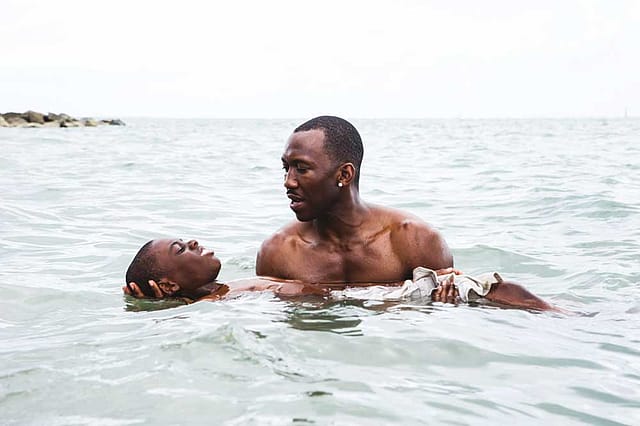Movie Review: Moonlight

Though perched precariously on the thin blue line between sentimentality and emotional truth, 'Moonlight' remains a poignantly told document of the traumatizing growing up experience of so many young African American men who come from dysfunctional family backgrounds. In this story, poverty, drugs and crime take up so much space in the mind of Chiron (played by three different actors as he grows up) that it literally makes him clam up as a little boy. As a teenager, and then an adult, he becomes monosyllabic. Yet, miraculously, his personality and his soul remain untouched all through, and he is consistently the same human being till the end of the film; gentle, sensitive, empathetic and genuine.
This is the achievement of 'Moonlight'; the creation of a singular and unique persona using three different actors. It requires high skill in the casting and direction of performers, and all credit to director Barry Jenkins for guiding the child actor (Alex Hibbert), the teenager (Ashton Sanders) and the silent and powerful adult (Trevante Rhodes) through a narrative that brings to life male vulnerability in the scorched environment of an inner city landscape where drugs, single mothers and flawed father figures are the images of nurture for a child growing up black and poor.
The movie is set in Miami, and till about halfway through, it absorbs us in the world it depicts, but does not touch any raw nerves. The film seems to be straining hard for the evocation of sympathy. It is a sad story, but has not affected us as deeply as it could have.
Modi Rearms the Party: 2029 On His Mind
23 Jan 2026 - Vol 04 | Issue 55
Trump controls the future | An unequal fight against pollution
The turning point in the narrative arrives at an exactly identifiable moment. This is when Chiron is in high school and is severely beaten up by his class-mates. The school counselor who speaks to him advises him to report the incident. Silent as usual, he goes home and immerses his head in a washbasin full of ice to relieve the agony of the cuts and bruises on his face. When he lifts his head up, he instantly sees his world with perfect clarity, recognizes the cul-de-sac that he faces, and resolves to reverse the direction of his life. Interestingly, later on in the film, when we see him as an adult in Atlanta, Georgia, and a cloud of emotional uncertainty drifts above him, he plunges his face again into a washbasin full of ice. It works like balm to his wounds which are, this time, psychological.
By now his drug addled mother, Paula (Naomie Harris), prematurely aging and in 'rehab', has come to some realization of how abusive she was to her son when he was a little boy, and what that abuse has done to him as a man. The scene of their reconciliation – perhaps more a scene of their acceptance of each other as individuals in an indivisible mother and son bond – is one of the most moving in recent American cinema.
It is only when you get to the end of the film that the residue from the earlier two parts, when Chiron was a boy and then a teenager, trickles into the persona of Chiron, the man. Eventually, the movie does turn into an organic whole. Not while you watch it. But slowly, unexpectedly, and on reflection, 'Moonlight' becomes a movie watching experience that stays with you.
